Yemen: inside the ‘world’s worst humanitarian crisis’
After six years of war, the country is struggling with widespread poverty and famine, with dengue fever and malnutrition killing more children than bullets or Covid-19
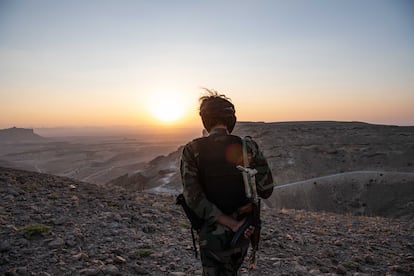

“This is a fantastic place. It’s a journey through time.” A British woman named Munazza Chamdhary wrote these words on November 30, 2007, in the guest book inside the small museum of Habban, in the province of Shabwah in central Yemen. It is one of many villages in the country that now lie deserted and afflicted by poverty. The powdered milk tins and canned tomatoes dating back to the days when Yemen was a British colony share dusty shelf space with locally made washbowls inside this old adobe building. But the last tourist left long ago, the final pages in the guest book are blank and children now burst into tears when they see a foreigner.
Reem Bassam, 28, is a resident of Habban. She has to travel nearly three hours by car to get to the only public hospital in Ataq, the capital of the administrative area, where her daughter is being treated for severe malnutrition. Reem crouches over the hospital bed and waves away the flies that hover over six-month-old Muna’s pale face. The hospital has 120 beds and four operating rooms. The war has disabled half of the country’s medical centers. “This is the nearest one,” says the mother in resigned tones.
Just like the rest of Yemen’s population of 30 million, Reem is surviving as best she can after six years of war and increasing poverty in the middle of what the United Nations has described as “the world’s worst humanitarian crisis.” The various war fronts have caused more than 110,000 casualties – 10% of them civilians – and displaced 3.6 million people from their homes. Around 80% of Yemenis need humanitarian assistance and the country has been split in two: the Houthi-controlled north, which is backed by Iran, and the south, which has been fractured since 2017 into two camps: the secessionists supported by the United Arab Emirates on one side, and on the other the followers of the government of President Abdrabbuh Mansur Hadi, who is backed by Saudi Arabia. And yet, in the poorest country in the region, more children are dying of dengue fever and malnourishment than from bullet wounds or Covid-19.
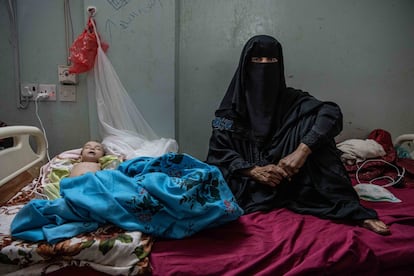
Since the beginning of the coronavirus pandemic, the UN has recorded 2,067 infections and 601 deaths from Covid-19 in the entire country. Yet in Shabwah alone, the director of Ataq General Hospital, Ali Nasser Saeed, says there have been 3,480 cases of dengue out of a national total of 52,000. Out of the 60 deaths recorded last month, 15 were caused by the mosquito-borne virus. Besides that, diseases that had long been eradicated are making a comeback, including cholera and diphtheria. And new ones like chikungunya are finding fertile ground here.
A few months ago, Saudi aid provided Shabwah province with its first laboratory to conduct over 3,800 PCR tests. Only 90 results have come back positive for coronavirus, and there have only been 46 deaths attributed to Covid-19 in the entire province. “We haven’t recorded a new case for two months,” says Hisham Said, who is in charge of the brand new (and empty) facilities. Some of the medical staff claim this inexplicable lack of infections is due to “Yemenis’ high morale.” But the UN is warning about under-testing and notes that there is a social stigma associated with having the virus.
At the hospital in Ataq, Covid-19 is not the problem. Six-year-old Rami Saleh is lying under a mosquito net, struggling to defeat the dengue fever. His mother’s eyes blaze with fury beneath her niqab as she complains about rising food prices – 15% since 2018 according to the UN, while the local currency, the rial, has depreciated by two thirds of its value. Fatima also criticizes a health system that forces patients to cover 50% of every hospital bill. The cost of treating common diarrhea is 10,000 rials (€34) in a country where the average salary is €100 a month. Doctor Mohammad Yiradi examines two babies with severe malnutrition as the infants struggle to breathe. The non-profit organization Save The Children has warned about nearly endemic malnutrition in Yemen, where new negative records are being set: there was a 10% rise in child malnourishment this year, meaning that 100,000 children under the age of five are caught in a life-or-death struggle.
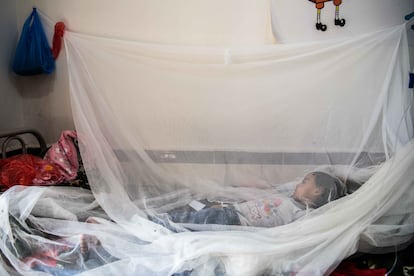
On top of the Covid-19 crisis, the war, the famine and the widespread poverty, Yemen is also dealing with difficulties accessing much-needed fuel due to a blockade imposed by the coalition on the north of the country. The crisis makes trips to the city more expensive, and not all parents can pay the cost of a taxi to take their ill children to the hospital. Access to water of any kind, whether potable or not, poses another daily challenge for families in a scenario where schooling became a distant priority long ago. “We are very disappointed with the international community’s assistance,” says the head of the Human Rights department at Ataq city hall. The UN has only received 24% of the €680 million requested this year to provide Yemen with humanitarian aid.
Meanwhile, at the offices of Shabwah Governor Mohammed Saleh Bin Adio, around 50 men are busy carrying pink-hued plastic bags to and fro. Inside the bags are stems of a plant called qat, which has stimulating properties similar to amphetamines. The men peel off the leaves and chew on them during the six-hour debate while the room fills up with tobacco smoke. Bin Adio, who has been governor for two years, talks about all kinds of projects ranging from tourism developments to roads and hospitals, for the benefit of a small group of foreign reporters who are here on a trip sponsored by the Sana’a Center for Strategic Studies.
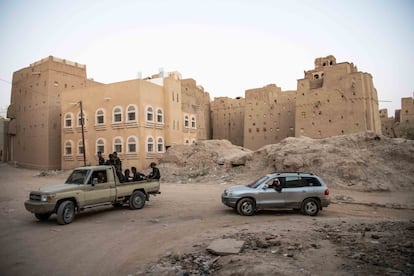
For the governor, it is essential for international corporations such as the French petroleum company Total to return to Shabwah, which is one of the three wealthiest provinces in Yemen thanks to its hydrocarbon reserves. “Right now 20% of income from hydrocarbons is going into the public coffers and being invested in development projects,” holds Saleh Ahmed Baodah, the head of the province’s energy department, adding that revenues from oil and gas since 2018 are in the range of $35 million (€29 million). This, in a territory of around 600,000 people.
“What’s the use of so many new roads if children are dying of malnutrition and there are no doctors in the hospital’s maternity ward? They are building them for military and commercial purposes only,” counters Salem Ahmed Hussein al-Marzaki, an official with the secessionist organization Southern Transitional Council (STC), at a closed-door meeting held inside a hotel in Ataq.
The governor of Shabwah says he has relaunched the reconstruction of a second hospital that will have twice as many beds as the first and will include a maternity ward. Construction originally began in 2014, but the site was bombed and the hospital never completed. The project, worth an estimated €1.7 million, makes provisions for a powerful generator to prevent power cuts to surgery rooms and intensive care units in a country steeped in darkness for lack of fuel.
Trapped between two wars
Inside the office of the governor of Shabwah, the conversation turns to war. “Five years ago, we barely had three square kilometers under our control, and now the 17 districts of Shabwah are under the orders of the legitimate government,” says the governor proudly. By “legitimate government,” he means the one headed by President Abdrabbuh Mansur Hadi, which is recognized by the international community even though Hadi runs the country’s affairs from the capital of Saudi Arabia, his greatest regional backer.
Inside the room, a man in his thirties with an expressionless face, several missing phalanx bones in his right hand and a rudimentary prosthetic implant under his right knee, speaks up to note that in the far-flung corners of Shabwah, there is not one but two civil wars going on simultaneously. The speaker is Brigadier General Abd Rabbo Laakab, who has just returned from the north where the Houthis are slowly advancing on the neighboring province of Mareb. This official has 2,500 soldiers under his command and fights in the regular army. For the last five years, he has been pushing back against the Houthi advance after the latter seized the capital Sanaa in September 2014. It was then that President Hadi was forced to move the capital to Aden, although he was expelled from this city in 2018 by the secessionist forces of the STC. The former president, Ali Abdullah Saleh, suffered a worse fate: in late 2017 he was assassinated by his erstwhile allies, the Houthis. “If Mareb falls, Shabwah will be next, and it will be the Houthis’ gateway into the south,” warns the brigadier general.
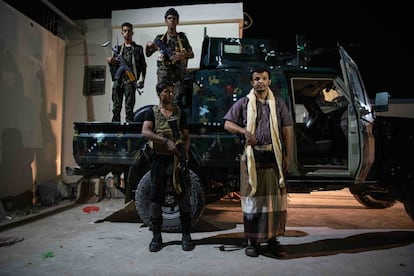
Since August 2019, Shabwah has also been dealing with a second front against the armed wing of the STC. The epicenter of the fighting is currently in the southern location of Shukkra. “The Emirates want to control all the ports, from the islands of Socotra to the strategic Strait of Bab-el-Mandeb, and including Aden. Their goal is also to evict the Al-Islah party,” says Salem el-Aulaki, who is in charge of the governor’s security detail. Both Hadi and the governor of Shabwah are allies of Yemen’s Islamist party, Al-Islah, which is the local branch of the Muslim Brotherhood that has taken over political and geographical ground wrested out of the hands of the Houthis and Al Qaeda. The Emirates are attempting to fight this expansion with over 15,000 local militia.
The Riyadh agreements of November 2019 aimed to end the fighting in the south between the two main allies of the coalition – the UAE and Saudi Arabia together with Egypt and Bahrain – and to unify all efforts against the Houthi rebels under a government with 24 ministers, after a pullout of STC militias from Aden. For now, the pact has gotten nowhere. For Governor Bin Adio, the Emirates are an invading power that has its sights set on Yemen’s resources, including the Balhaf reserves in the south of Shabwah. Around 200 Emirati nationals and 800 Yemenis are guarding the spot, he notes about a key facility and port that are used to export oil and liquefied gas. To the members of the secessionist party, it is Riyadh that is imposing its agenda on the country.
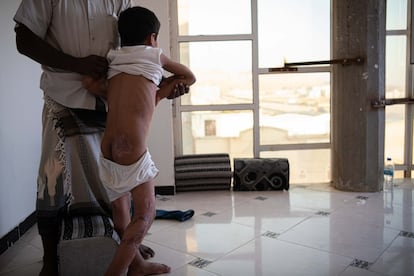
“To the Saudis, the main enemy are the Houthis and thus [the importance] of maintaining security along their southern border with Yemen,” continues Salem el-Aulaki. The eternal battle for regional control between Riyadh and Tehran is also at play on this front where the religious confrontation between Shiites and Sunnis makes way for deeper-rooted tribal dynamics. Iran, for its part, has positioned itself as a political champion of the Houthi faction, which professes Zaidism, a religious school of thought closer to the Shiites.
“The main thing is for the Saudis and the Emiratis to settle their disputes and to have stability and job creation,” says Sheikh Saleh Jarbou al-Nassi, a tribal leader in his seventies, during a dinner in the desert of Shabwah. The option of a federal state seems to please quite a few of the leaders present at this gathering. The twenty-somethings are wearing the traditional abaya robe with a jambiya (a local dagger) hanging from their waist and a rifle slung over their shoulder. “There is no job other than a soldier’s job,” say the young men, whose career alternatives are herding cattle or keeping bees.
“Yemen’s problem is not military, it is economic. Maintaining security is key to the return of foreign and local investors,” says the governor in optimistic tones. A builder named Said Atif al-Qaladi has taken up the challenge by launching a €3 million project to create a resort on the shores of the turquoise waters that bathe the beaches of Bir Ali, a regular landing spot for migrant boats. “We are tired of fighting, of killing and of getting killed. Yemen has been at war for 50 years,” concludes the governor of Shabwah, adding that peace means bringing the country back under the control of President Hadi.
Fifty years later, under the impunity that all the sides award themselves, the war continues to claim more victims. One of them is Abdelaziz Awal Saleh, who at the age of seven has already undergone half a dozen surgeries and whose skinny body is covered with stitches. On June 14, artillery fire from the Yemeni army shattered his home in the village of Nusaab, located 35 kilometers from Ataq, during a fight with a neighboring tribe. The child’s father, Abu Saleh Salem, 37, says he had to sell his cattle and borrow money from his neighbors to pay the €40,000 medical bill. The government put up a third of the amount. Abdelaziz can no longer ride a bike, and he drags his right leg as he walks with help from others.
Torture in secret prisons
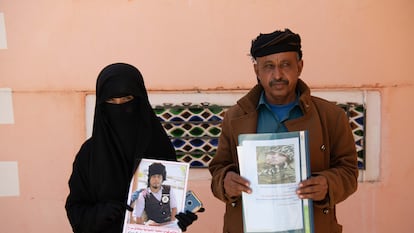
Reports of torture and forced disappearance are piling up in Yemeni courts, which are so overstretched that civilians often turn to tribal leaders to mediate in their search for justice and financial redress. Human Rights Watch has identified up to 11 secret prisons run by Emiratis and Saudis. Survivors are also accusing the local military as well as secessionists of running illegal detention centers where sexual abuse is rife, according to mounting testimony.
Salem al-Rabizi, 23, has been through two of these feared prisons: the one in Ryan, in the coastal town of Mukallah, and the one in Balhaf, in the south of Shabwah. The young man went missing on June 10, 2019 when elite Yemeni forces trained by the UAE – and known as the Nukhba – took him away in handcuffs. “He had written a message criticizing the UAE on Facebook,” explains his sister Shaima, 22. She and her father Awad Ahmed, 52, began an endless journey to locate the eldest of six siblings. With teary eyes, they explain how Salem left a message on voice mail, giving them renewed hope that he was still alive. They finally found him inside the central prison of the eastern department of Hadramouth. Shaima and her father show a collection of requests made by officials in Shabwah demanding Salem’s immediate release. But the petitions fall on deaf ears in a corner of Yemen run by secessionists and where the penitentiary follows orders from the Emirates. “They [Saudis and Emiratis] have stolen the country from us: we cannot fish in our seas, or use our oil, or our airports, and we cannot even visit our relatives inside illegal jails,” protests Ahmed.
Another 26-year-old man who goes by the pseudonym Odey also spent time at the secret prison in Balhaf. In a deliberate tone, he lists the succession of tortures that he endured while blindfolded by “men with Saudi and Emirati accents.” He was accused of cooperating with the local branch of Al Qaeda and subjected to electric shocks, waterboarding, sleep deprivation and long hours spent hanging from ceiling chains, all of which fed his desire for revenge against the UAE: “We made a mistake when we allowed them into our country: our greatest enemies were not the Houthis, it was them.”
English version by Susana Urra.